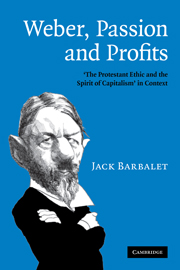Book contents
- Frontmatter
- Contents
- List of figures
- Acknowledgements
- Note on citations
- Introduction
- 1 From the inaugural lecture to the Protestant Ethic: political education and German futures
- 2 From the Protestant Ethic to the vocation lectures: Beruf, rationality and emotion
- 3 Passions and profits: the emotional origins of capitalism in seventeenth-century England
- 4 Protestant virtues and deferred gratification: Max Weber and Adam Smith on the spirit of capitalism
- 5 Ideal-type, institutional and evolutionary analyses of the origins of capitalism: Max Weber and Thorstein Veblen
- 6 The Jewish question: religious doctrine and sociological method
- Conclusion
- References
- Index
6 - The Jewish question: religious doctrine and sociological method
Published online by Cambridge University Press: 22 September 2009
- Frontmatter
- Contents
- List of figures
- Acknowledgements
- Note on citations
- Introduction
- 1 From the inaugural lecture to the Protestant Ethic: political education and German futures
- 2 From the Protestant Ethic to the vocation lectures: Beruf, rationality and emotion
- 3 Passions and profits: the emotional origins of capitalism in seventeenth-century England
- 4 Protestant virtues and deferred gratification: Max Weber and Adam Smith on the spirit of capitalism
- 5 Ideal-type, institutional and evolutionary analyses of the origins of capitalism: Max Weber and Thorstein Veblen
- 6 The Jewish question: religious doctrine and sociological method
- Conclusion
- References
- Index
Summary
When Weber first wrote The Protestant Ethic and the Spirit of Capitalism at the beginning of the twentieth century he had the benefit of – and drew upon – two recently published works by Werner Sombart, namely Modern Capitalism [Der Moderne Kapitalismus] (1902) and The German Economy in the Nineteenth Century [Die deutsche Volkswirtschaft im Neunzehnten Jahrhundert] (1903). Weber agreed with the importance given in these books to the idea of the ‘spirit of capitalism’, but he disagreed with Sombart about where this ‘spirit’ is to be socially and historically located. Weber argued, for instance, in disagreement with Sombart, that the German national character, because it is religiously Lutheran and therefore traditional (as we saw in chapter 2), is not linked to the spirit of capitalism. The spirit of capitalism is modern, not traditional. The British and American national characters, Weber went on to argue, through their exposure to Puritanism and Calvinism, are connected with the spirit of capitalism. At the same time Weber accommodates Sombart's view of the Jews as a religious group associated with trade, not entrepreneurship, and in that sense implicated in the emergence and history of capitalism in an entirely subordinate and ancillary position.
The intellectual borrowing between Weber and Sombart was not one way, however. Weber's treatment of Protestantism in the Protestant Ethic led Sombart to reflect further on the question of the role of the Jews in the history of western economic development.
- Type
- Chapter
- Information
- Weber, Passion and Profits'The Protestant Ethic and the Spirit of Capitalism' in Context, pp. 183 - 213Publisher: Cambridge University PressPrint publication year: 2008



